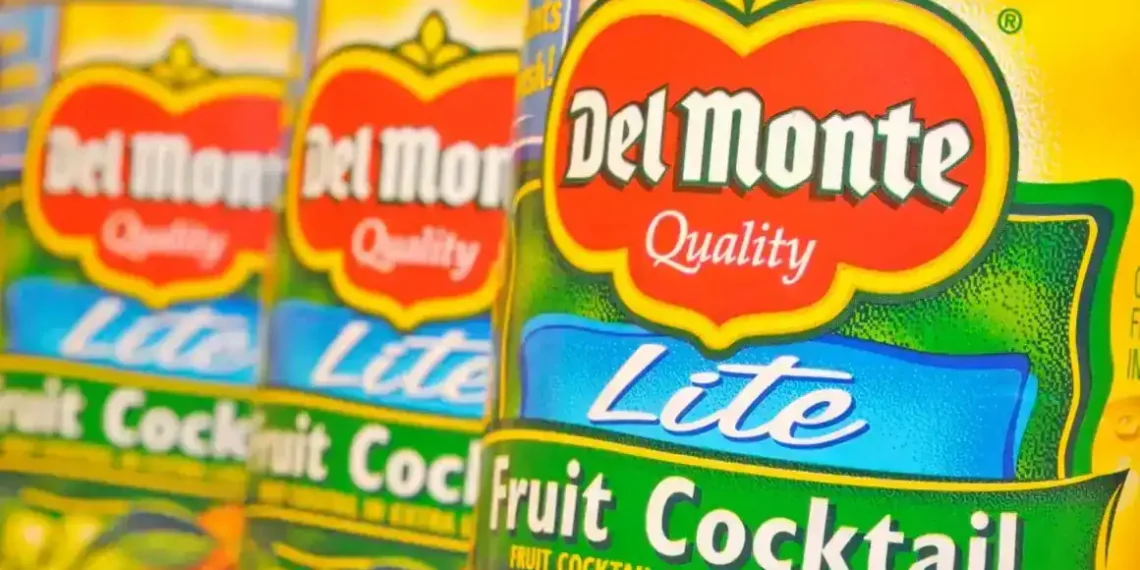Del Monte Foods Files for Bankruptcy After 138 Years, Citing Declining Demand and Rising Costs
Del Monte Foods, the iconic grocery brand behind canned fruits, vegetables, and kitchen staples, has filed for Chapter 11 bankruptcy protection as it seeks a buyer for its assets. The move marks a major turning point for the 138-year-old company, long known for products like Contadina tomatoes and College Inn broths.
Chapter 11 Filing and Asset Sale Announced
The company made the announcement late Tuesday, confirming it is entering a court-supervised sale process to restructure its finances and chart a path forward. Del Monte has already secured $912.5 million in funding to continue normal operations during the transition, especially as it heads into peak canning season.
“After a thorough evaluation of all available options, we determined a court-supervised sale process is the most effective way to accelerate our turnaround and create a stronger and enduring Del Monte Foods,” said CEO Greg Longstreet.
Court documents show that Del Monte’s liabilities are estimated to fall between $1 billion and $10 billion.
Why Is Del Monte Filing for Bankruptcy?
According to the company, a combination of shifting consumer behavior, macroeconomic pressures, and rising operational costs played a role in the decision.
Consumers have increasingly moved away from preservative-heavy canned goods in favor of fresh and healthier alternatives, leading to lower demand for legacy brands like Del Monte. At the same time, a growing preference for private label grocery items has cut into Del Monte’s market share.
“Del Monte says that consumer demand has declined, causing it to incur increased costs related to surplus inventory,” said Sarah Foss, global head of legal and restructuring at Debtwire. “It has had to warehouse excess stock and ramp up promotional efforts to move product off shelves.”
A Storied History Facing a Modern Crisis
Founded in 1886, Del Monte has long been a fixture in American kitchens. The company opened its historic San Francisco cannery in 1907 and, by 1909, claimed to operate the largest fruit and vegetable cannery in the world.
The brand grew to become synonymous with shelf-stable produce and was a trusted name for generations of consumers.
But as grocery habits evolve, even established brands have struggled to keep up.
“With an improved capital structure, enhanced financial position, and new ownership, we will be better positioned for long-term success,” said Longstreet.
What Happens Next for Del Monte?
Del Monte says it will continue regular operations during the sale process, supported by the new funding package. The company hopes that a successful sale and restructuring will lead to a revitalized business model better aligned with modern consumer preferences.
For now, its canned corn, green beans, and tomato sauces will remain on store shelves, but its future ownership and direction remain uncertain.
This article was rewritten by JournosNews.com based on verified reporting from trusted sources. The content has been independently reviewed, fact-checked, and edited for accuracy, neutrality, tone, and global readability in accordance with Google News and AdSense standards.
All opinions, quotes, or statements from contributors, experts, or sourced organizations do not necessarily reflect the views of JournosNews.com. JournosNews.com maintains full editorial independence from any external funders, sponsors, or organizations.
Stay informed with JournosNews.com — your trusted source for verified global reporting and in-depth analysis. Follow us on Google News, BlueSky, and X for real-time updates.














